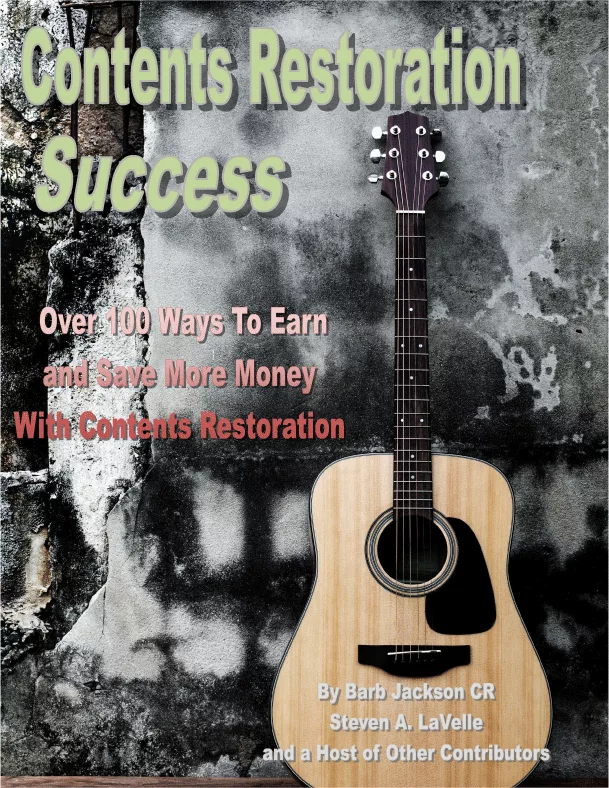Unprepared Restoration Contractor is Dealt Devastating Blow at Trial
Litigating restoration cases can be a minefield for the inexperienced
On September 4, 2013, the mock trial of Moore v. Heatman went forward at “Cross-Examination: The Live Courtroom Experience” at The Experience Convention in Las Vegas, with the Honorable Judge James Dread (played by Jim Holland) presiding.
The Plaintiff, William (“Bill”) Moore (played by Ron Reese), a licensed general contractor, was represented by John Dewey (played by yours truly) of the Law Offices of Dewey, Scroom and Howe. The Defendant and Cross-Complainant, Chaz Heatman (played by Charlie Cressy), represented himself.
Moore filed the lawsuit against Heatman alleging $60,000 due for services rendered at Heatman’s home. The suit was based on two alternative theories of recovery: breach of contract and quantum meruit.
Heatman filed a cross-complaint against Mr. Moore alleging damages arising from deficient workmanship in the sum of $50,000. He alleged that Moore used biocides without Heatman’s consent and that it would cost $20,000 to remove the biocide residue and clean the house. He also alleged that Moore negligently cut carpet and added new seams, and that it would cost $30,000 to replace the carpet in two bedrooms and a hallway.
Mr. Heatman lived alone in a modest 2,000 square foot single-family residence in Atlantic City, New Jersey. On September 4, 2010, a major storm struck and the house was damaged by wind-driven rain which intruded into two bedrooms and a bathroom. There was carpet in the bedrooms and hallway and tile floor in the bathroom.
The property was slab-on-grade construction, with a stucco exterior and drywall interior with vinyl wallpaper throughout. The third bedroom, kitchen and living room did not get wet from this loss. The house was built in 1990 and still had its original carpet.
The home was insured by Gamblers Atlantic Insurance Co. Mr. Heatman made a claim with Gamblers Atlantic on September 4, 2010, the date of the loss. Mr. Heatman waited to hire a contractor until his insurance company inspected the loss. Gamblers first responded on September 10, 2010, with an inspection by adjuster Joe Canuck (played by Darren Hudema).
Mr. Heatman signed a Work Authorization with Mr. Moore on September 10, 2010, which stated that he was hiring Mr. Moore to restore the property to its pre-loss condition, and that Mr. Heatman was directing his insurance company to send all payments for Mr. Moore’s work directly to Mr. Moore. The authorization also stated Heatman would be responsible for charges not paid by insurance. There were no other principal legal terms in the authorization. It did not state the cost of the work and Mr. Moore did not provide Mr. Heatman with a price list. Mr. Heatman believed Mr. Moore would accept the insurance proceeds as payment in full, and did not ask for the price.
Mr. Moore began work on September 10, 2010, installing 11 air movers, four dehumidifiers and three air scrubbers, which ran for eight days each. After he turned on the drying equipment on September 10, he removed baseboard, which revealed mold. He removed drywall that was too wet to dry, which also revealed mold within the wall cavities, which he remediated following industry standards. He only worked in the three rooms that got wet. He completed the repairs on December 10, 2010 and billed $70,000 for the work the same day.
IS WIND-DRIVEN RAIN CATEGORY 3 WATER?
Moore contends that the application of a biocide was justified because the water fell within the IICRC’s “Category 3” for grossly-contaminated water. Water damage restoration consultant Edward X. Spirt (played by Barry Costa) testified on Moore’s behalf that restorers must err on the side of caution and that wind-driven rain should be considered Category 3 water in the absence of compelling evidence supporting a different categorization.
Spirt contended that high winds can aerosolize dust and soil, which can be captured in wind-driven rain, along with the fertilizers, pesticides, heavy metals and other contaminants contained in the dust and soil. He offered an illustration of a tornado over a farm. It appeared to be drawing manure into the air and therefore, the rain.
Spirt testified that the water in this case should also be considered Category 3 because it penetrated the walls and sat for six days before drying efforts began, which likely led to a proliferation of bacteria and fungi, although no samples were taken.
Thadeus (“Thad”) Tomuch (played by Jeff Bishop) is a licensed restoration contractor but has not performed actual restoration work in a decade. He now works as a professional consultant and was hired as an expert witness for this case by Gamblers Atlantic. He prepared a competitive bid allowing $5,000 for drying (based on three days of drying) and $15,000 for repairs and nothing else. He disallowed mold remediation.
Tomuch testified that Spirt’s illustration of alleged airborne manure is actually fire retardant dropped into the eye of the storm. Moreover, Tomuch contended the illustration is irrelevant because there was no tornado in this case.
WHAT IS THE STANDARD OF CARE FOR THE USE OF BIOCIDES?
Tomuch pointed out that the use of biocides is discouraged by the American Conference of Governmental Industrial Hygienists (ACGIH), and that they pose unnecessary potential health hazards to occupants. He believes the proper approach is to assume water is Category 1 and work up into higher categories from there, as warranted by the known facts of the loss. He testified that the intent of the IICRC standards is to categorize water based on actual evidence, rather than speculation, and that here, there was no data to show that the water was actually contaminated. He opined that the water at issue in this case should have been treated as Category 1. The jury disagreed, and found that the water was Category 3.
The expert for the insurance company testified that if the water had been Category 3, as Moore alleged, then the carpet should have been removed and the insurance company should not have been billed for the cost to dry the carpet. At trial, Moore was caught off guard by that argument, and it took on great significance to the jury. To make matters worse, Moore did not have thorough records of the atmospheric conditions during the drying.
In an effort to do damage control at trial, counsel for Moore belatedly suggested that the water in the wall cavities was more contaminated than the water in the carpet and that the walls should have been addressed as Category 3 water. The jury found that the carpet should have been removed. It found that Moore violated the standard of care by failing to obtain the informed written consent of the homeowner to apply biocides. However, it found that it was not a violation of the standard of care to apply biocides under these circumstances. The jury awarded the homeowner nothing on his cross-complaint, which alleged $20,000 in expenses to decontaminate the house to remove biocide residue.
VERDICT FOR HOMEOWNER ON BREACH OF CONTRACT
Every legal claim has a basic set of elements which must be proven in order to prevail. Four out of five is not enough. In order to prevail on claim of breach of contract, the plaintiff must prove, among other things, that he performed all of his duties under the contract, except those that were waived or excused.
In this case, the jury found for the contractor on all the elements of breach of contract - except that he performed all of his duties under the contract. The work authorization did not specify what was to be done with the carpet, but the jury inferred a contractual duty to remove the carpet. So a crucial element of the contract claim was not met. As a result, the contractor recovered zero on his contract claim.
VERDICT FOR CONTRACTOR ON HOMEOWNER’S CROSS-COMPLAINT
Conflict arose between Mr. Heatman and Mr. Moore regarding cuts and seams Mr. Moore made in the carpet in the two bedrooms. Mr. Heatman claimed the seams were visible and unnecessary. Mr. Moore claims the seams are invisible and were necessary to float the carpet during the drying. At least one juror believed that seams are never guaranteed to be invisible.
The homeowner failed to produce evidence that the house needed to be decontaminated due to biocide residence. His claim for $20,000 to replace the carpet was rejected by the jury because it determined the carpet needed to be removed anyway because it had been contaminated with Category 3 water. As result, the homeowner was awarded zero on his cross-complaint.
VERDICT FOR CONTRACTOR ON QUANTUM MERUIT
Quantum meruit is intended to prevent the unjust enrichment of the owner where she received a benefit and did not pay for it when fairness required that payment be made. It is the saving grace for many restorers because work authorizations often bear no resemblance to a payment contract. Quantum meruit can be used to address situations where no contract exists or where a contract exists but for some reason is unenforceable. In that event, a court may imply a contract to avoid an unjust result. These contracts are called “quasi contracts.”
Quantum meruit also describes a method used to determine the exact amount owed to a person. A court may measure this amount either by determining how much the defendant has benefited from the transaction. The law abhors forfeiture.
Here, the jury found for the contractor on the quantum meruit claim, but dealt him a devastating blow on the monetary award. It found that the reasonable value of the services he rendered was only $40,000 - a reduction of $30,000 dollars off Bill Moore’s invoice. In effect, the jury gave the homeowner the demolition, drying and biocides for free - and a $10,000 bonus to boot. Since the contractor had already been paid $10,000, the net result of the case was a $30,000 verdict for the contractor.
VIOLENCE IN THE COURTROOM
John Dewey, the arrogant lawyer for the contractor, strenuously objected to the court’s findings and moved to set aside the verdict on grounds that it was not supported by the weight of the evidence. The motion was denied. But when Judge Dread adjourned the matter, Mr. Dewey continued arguing. Judge Dread warned Mr. Dewey that he would be held in contempt if he did not cease. Not heeding the warning, Mr. Dewey continued and was held in contempt. He erupted in response to the contempt finding and the judge ordered that he be taken into custody. But he resisted arrest. He pushed the bailiff, and was badly beaten with plastic baton and dragged out of the courtroom by his feet.
LESSONS LEARNED
This is a classic example of how mishandled cases can lead to unfair - or even unintended - results. It also illustrates the risks inherent in our legal system. The prudent restorer will carefully document all the pertinent events on a job, what happened, where, when and why. Litigating restoration cases can be a minefield for the inexperienced. Prudent counsel for restorers will thoughtfully consider the ramifications of each argument, such as arguing that water was Category 3. At the root of every successful restoration case is thorough preparation.
SPECIAL THANKS: The author would like to extend a special thanks to Ron Reese, Jeff Bishop, Barry Costa, Charlie Cressy, Jim Holland, Darren Hudema, O.P. Almaraz, and Jim Milne for their excellent performance as cast members in Cross-Examination Live.
Looking for a reprint of this article?
From high-res PDFs to custom plaques, order your copy today!








